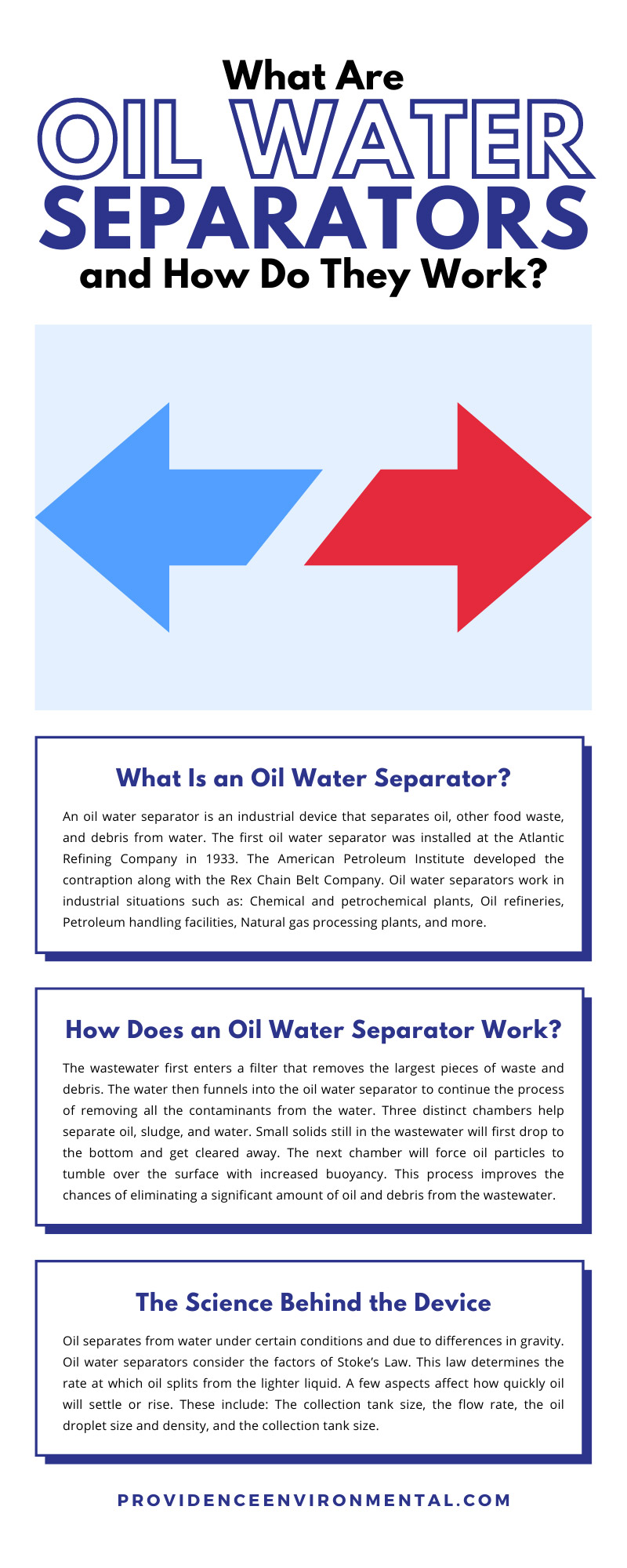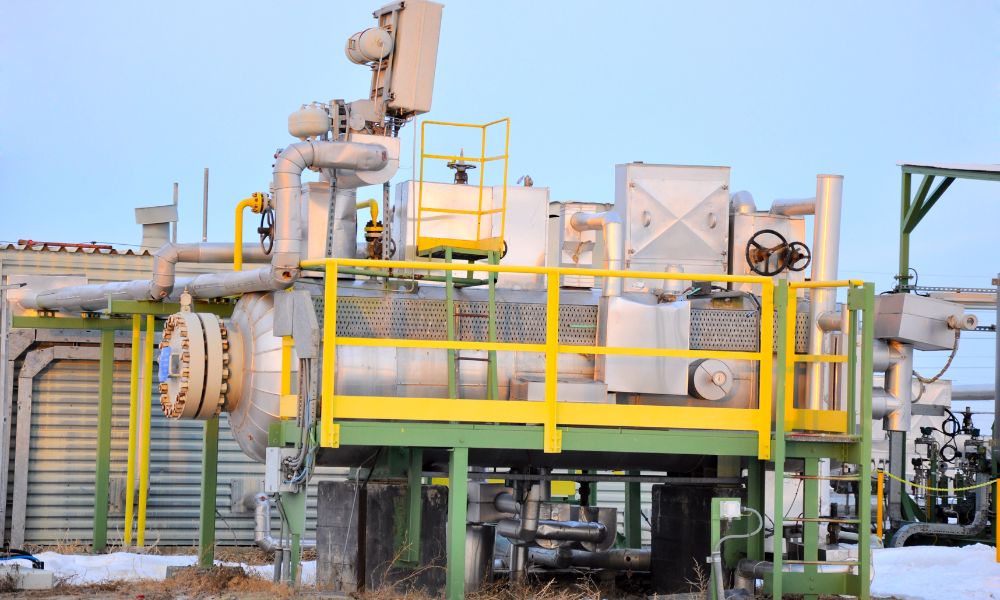We’ve all heard the old saying that oil and water don’t mix. Oil water separators play a significant role in many industries for multiple reasons, including in the oil industry’s environmental protection efforts. The devices exist to remove any fat from water and allow the clean water to flow onto the process. Are you wondering what oil water separators are and how they work? Continue reading for a deeper understanding.
What Is an Oil Water Separator?
An oil water separator is an industrial device that separates oil, other food waste, and debris from water. The first oil water separator was installed at the Atlantic Refining Company in 1933. The American Petroleum Institute developed the contraption along with the Rex Chain Belt Company.
Oil water separators work in industrial situations such as:
- Chemical and petrochemical plants
- Oil refineries
- Petroleum handling facilities
- Natural gas processing plants
- And more
These devices aid wastewater treatment by skimming the water for suspended oils and solids. The design of oil water separators specifically targets grease, oil, fat, and other sludge based on the gravity difference between water and oil. The wastewater sits between the heavier sinking debris and the lighter grease and oil floating on the top. The device will skim the top layer and scrape away the bottom, allowing the wastewater to move along for additional treatment.
How Does an Oil Water Separator Work?
The wastewater first enters a filter that removes the largest pieces of waste and debris. The water then funnels into the oil water separator to continue the process of removing all the contaminants from the water.
Three distinct chambers help separate oil, sludge, and water. Small solids still in the wastewater will first drop to the bottom and get cleared away. The next chamber will force oil particles to tumble over the surface with increased buoyancy. This process improves the chances of eliminating a significant amount of oil and debris from the wastewater.
The Science Behind the Device
Oil separates from water under certain conditions and due to differences in gravity. Oil water separators consider the factors of Stoke’s Law. This law determines the rate at which oil splits from the lighter liquid. A few aspects affect how quickly oil will settle or rise. These include:
- The collection tank size.
- The flow rate.
- The oil droplet size and density.
- The collection tank size.
An oil water separator creates the ideal conditions to divide the oil, water, and other debris.
Benefits Oil Water Separators Provide
Facilities with the proper oil water separator can process wastewater effectively and send the clean water back into the environment or sewer. With an adequate design, your company will experience incredible benefits.
Environmental Compliance
There are local and federal regulations with which businesses must comply. When you have an oil water separator, you meet these clean water regulations. Everyone benefits from a clean and beautiful environment.
Effective Oil Removal
An oil skimmer can work more efficiently and accurately when an oil water separator creates two distinct layers. Oil water separators provide adequate space and time for the oil to split from the water, leaving the oil floating freely. This action makes it easier for an oil skimmer to get the job done.
Reduced Maintenance
When a machine effectively does its job, other devices face fewer challenges and don’t have to work as hard. Efficient oil removal and separation means less maintenance is required to keep the system running. Plus, the downstream machinery will operate at a peak performance level.
Improved Wastewater Treatment
Effective treatment processes and filtration equipment will last longer and perform better when an oil water separator works correctly. The separation and removal of oil and wastewater allow for a more successful treatment process.
Potential Extra Revenue
You’ll find, in some cases, you can sell reclaimed oil as a valuable product. These sales can bring extra revenue to your business.
Why Do We Need Oil Water Separators?
Why do these devices exist? Why should we take time to separate oil from water? Not only can oil clog your pipes, but it also poses an environmental threat. It disrupts ecological systems and is harmful to animals, humans, and plants. These oils include cooking oils and grease from restaurants, homes, and other commercial industries.
The reason above is exactly why oil water separators exist. You’ve seen the news coverage of how oil spills affect the environment. Your cooking oil is similarly damaging to the ecosystem. All of the little things can add up to create one ecological disaster.
Types of Oil Water separators
There are four types of oil water separators that we’re going to discuss.
Hydrocyclone System
This system uses an active vortex to split the water, oil, and sludge. The dense water becomes pushed to the outer edges using centrifugal force and then slides towards the outlet. The system forces the oil towards the top so that it enters a used oil tank. The hydrocyclone system is highly useful for factories and significantly contaminated waters.
Conventional Gravity Separators
Gravity forces the oil and water to separate, then a skimming device removes the oil from the top and scrapes the leftover food waste or other debris from the bottom. The water is free to flow onward for further processing.
Flotation Separators
Commonly referred to as dissolved air flotation, DAF, this device uses dissolved air to enhance the rate at which the oil rises. Water saturated with dissolved air combines with oily water to create tiny air bubbles.
The oil attaches to air bubbles and floats to the top, where they’re skimmed off and moved to another tank. Solids that drift to the bottom escape through a drain, which allowsthe clean water to continue to the next process.
Parallel Plate Gravity Separators
Parallel corrugated plates allow water and oil to flow between them, attracting the oil and causing it to become stuck. The oil will continue to stick until discharged into the reserve tank. The water will flow freely and clear of oil, where it can serve another purpose.
This blog should answer your question about what oil water separators are and how they work. They’re devices that help eliminate oil and debris from the water to continue further processing.
Providence Environmental has years of experience with government waste disposal. We provide government cleaning services in South Carolina for schools, the military, prison systems, and other government services.


